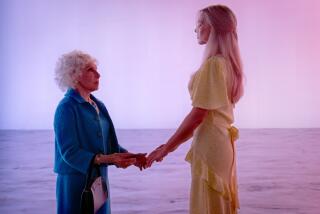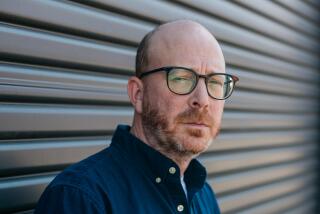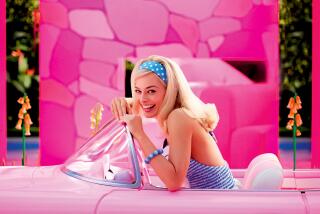Hefner and Ex-Bunnies Set to Toast the End of an Era
A bevy of bunnies from decades past surrounded Hugh Hefner, flashing come-hither smiles in response to photographers’ requests--”Heads up, girls!” Hef, reveling in the media attention, screamed, “I’ve changed my mind! I can’t give this up!”
About 180 former bunnies had turned up for a reunion at the Playboy Club in Century City, first in a week of events leading to the closing tonight of the L.A. club and the other two Playboy-owned clubs. They are the Chicago club and the ill-conceived Empire Club in New York, which debuted in November with male waiters, or “rabbits,” as counterparts to the bunnies.
The Showman at 60
If Hefner, ever the showman at 60, was putting on a good act for the grand finale, an act was all it was. In private conversation he was conceding that it no longer seems “appropriate” to “try to keep alive something really properly perceived as a reflection of the swinging ‘60s.”
Indeed, he acknowledged, “Society has moved on.”
Former bunny Bonnie Lockamy, now a 39-year-old title insurance saleswoman, put it a little differently. In 1986, she said, a Playboy Club key is no longer a hot item because “men can join the Sports Connection. That’s where all the beautiful girls are.”
Restaurateur Nick DeCourville, a longtime Playboy Club member who will be hosting former bunnies at weekly parties at Nick’s Fish Market in an effort to “keep the memory alive,” said that today the marketing of sex, even as fantasy, is passe. “Men and women are very sophisticated, very selective today. There’s diseases out there that kill you.”
Whatever, Playboy Club memberships, which peaked nationwide at close to 1 million in 22 clubs in the mid ‘70s, according to a club spokesman, have dipped precipitously. And revenues from Playboy Enterprises’ club division--26% of the $119.5 million total in the best year, 1970--this fiscal year dropped to 5% of total revenues of $192.3 million.
First Club in 1960
So tonight, simultaneous celebrations in the three cities will mark the end of an era that began with the opening of the Chicago club in February, 1960, and came here to Sunset Boulevard in 1965. (The L.A. club moved in 1973 to the ABC Entertainment Center in Century City.) The urbane, tuxedoed bunny logo will still beckon playboys to franchise operations in Des Moines, Iowa, Omaha, Neb., and Lansing, Mich. (all of which spokesmen report are “doing very well”) and to four locations in Japan.
Beneath a canopy of bunny balloons, celebrants at the demise of the Playboy Club dodged paper streamers and screamed pleasantries above the din of rock music. If this bunny reunion was the ultimate media event, it was also a class-A party--drinks on the house and all the expensive things to eat.
Hefner fielded back-to-back TV interviews, stopping occasionally to nuzzle his live-in girlfriend of three years, 22-year-old Carrie Leigh. A statuesque former centerfold swathed in pale fox, Leigh spent much of the time tugging at her Day-Glo pink strapless gown, which kept slipping precariously, and smoothing her elbow-length Day-Glo pink satin gloves, over which glittered a rhinestone bracelet.
For the onetime bunnies, though, it was rather like a sorority reunion. Screeches of recognition and bunny hugs. Sharyn Shipley, 31, a bunny who became a playwright and promptly wrote a play “about Playboy bunnies, what else?” (“Carytids,” produced here in 1978) bounced her 6-month-old daughter, Madison Rose, on her lap. For the occasion, the child was wearing a romper suit styled like a mini-tuxedo.
Judy Brandler, 41, who “opened the L.A. Club” and “set a world record” for longevity as the door bunny, a greeter’s job she described as “like a human tape recorder,” was exchanging reminisences with Bonnie Lockamy about bunny appearances on videos for Vietnam, the “Dating Game” and Solarcaine commericals.
“Once in a while you’d have somebody who’d sneak a little pinch,” Lockamy recalled of her bunny days. But, by and large, these bunnies’ memories had little in common with those of feminist Gloria Steinem, who in 1963 spent 17 days as a New York bunny on assignment for Show magazine. “Humiliating,” Steinem said of the experience, noting that she was a “thing, to be ogled, grabbed and propositioned.
But it was the camaraderie that Brandler, now a first-degree black belt karate instructor, and her bunny sisters seemed to recall all these years later. “Fix it, tuck it, push it up, whatever, we helped each other out,” she said.
Alice Nichols, 54, who was the first bunny mother, was there with her son Kevin, now 29. “He was 2 years old when I became a bunny,” she said, in Chicago. Nichols was “about retirement age,” which was 30, when she started her 11-year career as bunny and bunny mother but, she said, “if you still looked good, it was OK.”
She’ll never forget her first night as a floor bunny: “I go up to the first customer and say, ‘Hi. I’m Bunny Alice. May I see your membership key, please?’ The man said, ‘My name is Hugh Hefner. H-E-F-N-E-R. I said, ‘You don’t understand. You don’t get a drink unless I see your key.’ He said, ‘You don’t understand.’ ”
It was then, Nichols said, that “we decided we needed a training program,” and the bunny mother was born.
Onstage, Hefner was proposing a toast (in cola) “to the best of days, the best of times, the best of friends. To the good times, past, and the good times ahead.”
More than one bunny dabbed at a moist eye as the bunnies past, in unison, responded with a resounding, “Hip, hip, hooray!” for Hefner.
Keiko Fehmel, 33, wearing a ceremonial kimono for this occasion, was explaining that her first name is really Easter but, when she became a bunny at the L.A. club in the ‘70s, “Everybody would say, ‘Hi, Easter Bunny,’ ” so she started using her middle name. Fehmel, now a real estate broker, still groans when she remembers her skin-tight bunny suit--”You couldn’t eat. You couldn’t sit.”
Bunny Now a Nurse
Bunny Beverly Self came from Houston, where she is now an operating-room nurse. Platinum blond Bunny Frankie Helms (bunny class of ‘62) came from Las Vegas, where she is guest relations director at the Flamingo Hilton.
“A very sad celebration,” said Helms, who spent 15 years as a bunny and bunny mother, opening clubs in St. Louis, Jamaica, Denver and Atlanta. She smiled and said, “I have never cut the cord.”
Helms proceeded to demonstrate the “bunny dip,” a maneuver invented by Hefner’s brother, Keith, to avert baring of too much bosom when bunnies bent down to serve drinks. The technique is to point one’s bunny tail in the general direction of the patron and hold one’s tray out over the aisle. “If you spilled a drink,” Helms explained, “it didn’t hit anybody.”
Sometimes, Helms was confiding, there was less than met the eye poured into those well-boned bunny suits. She laughed and said, “We had a motto--’what nature’s forgotten, we take care of with cotton.’ We had to do something with some of them to give them a little cleavage.”
If bunnydom was, for some, a fun fling somewhat like being “a grown-up pom-pon girl,” as Candy D’Amato (bunny class of ‘62) put it, feminists have always viewed the concept a bit differently.
“The bunny was obsolete when Hefner put her in the Playboy Clubs to begin with,” said Toni Carabillo, former president of the Los Angeles chapter of the National Organization for Women and a onetime NOW national officer. “But he didn’t know that.”
Carabillo, who said she had never visited a club, added: “As the years went by and the image of women began to change, the bunny became almost an antiquity, a relic of the past.” And, with so many women in the work force, Carabillo noted, the Playboy Club was “an inappropriate place for management-type people to meet.” (Indeed, according to a Playboy spokesman, women account for only 20% of current keyholders, who pay $35 annually to join.)
On the other hand, Carabillo said, recognizing that bunnies made better money than, for example, bank tellers or switchboard operators, feminists have not “spent a lot of time condemning the women who worked in the Playboy Clubs. You can understand the appeal of these jobs. At the same time, you have waitresses in less exotic clubs protesting the costumes they have to work in.”
Embodiment of ‘Cute Sex’
“All this Gloria Steinem stuff, it ruined a lot of things we had that were good,” said Donna Hickox, who in 1962 was a singer on the Playboy Club circuit. (Today she does her singing “in a choir.”) To her, the bunny was the embodiment of “cute sex. I don’t think there’s anything wrong in being a sex symbol.” But today, with frontal nudity the norm in men’s magazines, Hickox said, “you really can’t tease anymore.”
Jonnie Nicely was never a bunny, but she was a Playboy centerfold--”August, 1956.” That was about 2 1/2 years after Marilyn Monroe started the whole thing as a centerfold. Nicely opened her copy of a 15-year commemorative edition of Playboy and pointed out Playmate Jonnie, rather demurely posed sideways, attired in striped toreador pants, one elbow strategically placed to hide much of her bared breasts.
“It opened many doors, not that I answered every knock,” Nicely said. But she did get a reading at Paramount. And today? “I build B-1 bombers,” she said, at Rockwell’s Palmdale facility.
The big-city clubs will soon be history, curiosities to be written about by sociologists and historians. Now Hefner is looking to “the small communities of America and overseas, where it is still the 1950s. We have a Mexican hotel chain approaching us (about opening a club).”
The bunny mystique still exists, he is sure, in Middle America, “for which this is still magic.” But it’s a magic that must now be put in a time frame and these “mini-franchises” that he envisions as the next chapter in the history of the Playboy Clubs will be “using the bunnies not as a contemporary symbol but as a symbol of the past.”
Hefner is talking about “camp variations” on the bunny theme, a contemporary twist on the skimpy bunny costume with cotton tail, ears and tuxedo collar and cuffs that wowed them back in the ‘60s.
‘I’m a . . . Romantic’
And if he was feeling nostalgic, well, it’s not as though homebody Hefner spent a lot of time at the Playboy Club. Asked, however, how many of his 25,000 bunnies he has been romantically involved with over the years, Hefner laughed and protested, “I couldn’t begin to answer a question like that. I’m first and foremost a romantic.”
Does he blame the feminists for creating a society that spelled doom for the clubs? Hefner shook his head. “It’s not a matter of blame. We have been through a dramatic social-sexual revolution” which, he said, Playboy magazine launched in 1953 by breaking the sex taboo.
And, he pointed out, Playboy magazine (with a monthly circulation of 4.1 million) is still “the most successful, influential, most profitable men’s magazine in the world” despite a circulation dip he attributes to the availability of X-rated cassettes, pay TV and “a sexually open society that we helped to create.”
So the big clubs are gone. Hefner shrugged. “I have no need to make more millions.” And, he added, “Since my stroke (in March of last year) I really understand the finite nature of everything.”
More to Read
Sign up for The Wild
We’ll help you find the best places to hike, bike and run, as well as the perfect silent spots for meditation and yoga.
You may occasionally receive promotional content from the Los Angeles Times.






